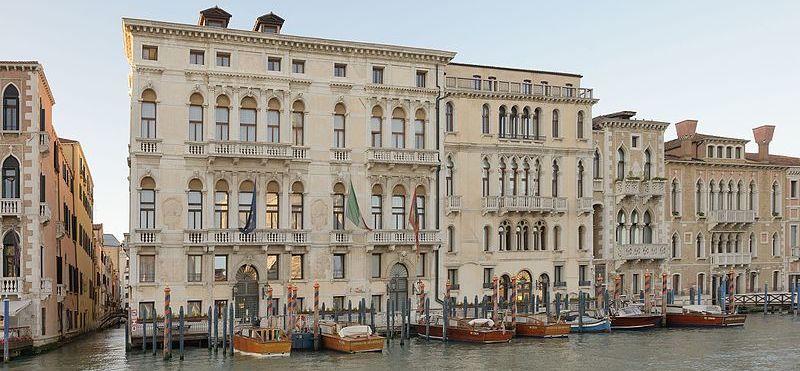Thank you for your message. The IPPA team will get back to you shortly. You first need to login here.

Program
International Summer School on Public Policy - Venezia-Padova EditionMonday 9 July, Palazzo Ferro-Fini, Canal Grande - Venezia
 Palazzo Ferro Fini-Venezia
Palazzo Ferro Fini-Venezia
Morning
9.15: Welcome Address
Roberto Ciambetti, President of the Legislative Assembly of the Veneto Region
9.30 – 10.00: Presentation of the Summer School
Introduction: Philippe Zittoun, General Secretary of IPPA
Maria Stella Righettini, University of Padova
10.00 – 12.30: Keynote Speech
Policy Design and policy learning: theories and approaches by Mike Howlett, Simon Fraser University (Canada)
Afternoon
14.30 – 16.30: Introduction to Working Groups: Mike Howlett, Ekaterina Domorenok and Giorgia Nesti
Evening
16.30 - Visit to Piazza San Marco
Tuesday 10 July, University of Padova
Morning
9.30 – 12.30: Course 1 by Giliberto Capano: Patterns of policy formulation and change: mechanisms and dynamics.
The focus will be on the way the dynamics of policy formulation (in terms of actors’ interactions, flows of ideas and interests pressures) can influence the content of policy design policy design in terms of the set of adopted instruments. Different theories different theories of policy (and institutional) change will be compared. Specific attention will be devoted also to the types of mechanisms that can be activated by different types of policy design and patterns of formulation. Thus the main questions to be debated will be: what really is an incremental/radical change in terms of instruments choice and activated mechanisms? Is Layering really a mode of weak/incremental change? Do the real effects of policy change depend either on the consistency and coherence of policy instruments adopted or on other factors like context, chance, political will? Can a mechanistic approach keep together instruments and contextual factors and thus offer a better understanding of policy formulation dynamics?
12.30-14.30: Lunch
Afternoon
14.30 – 17.30: Working Groups: Ekaterina Domorenok and Giliberto Capano
Wednesday 11 July, University of Padova
Morning
9.30 – 12.30: Course 2 by Claire Dunlop: Learning in policymaking. From formulation to evaluation.
There is considerable scientific and practical interest in learning in public policy, but what is it exactly, how do we measure it, and are all forms of learning efficient and legitimate? When do policy-makers learn the good or bad lessons, design the smart or incorrect incentives for learning, and listen to the best or worst teachers? Who legitimates these teachers by the way? In this highly interactive, practical seminar we will address these questions by building a robust conceptual framework grounded on different types of learning. We will then introduce and appraise the empirical methods available in political science and how they relate to theoretical propositions about the policy process. Along the way, we will find different characters: the teacher, the expert, the facilitator, the hired-gun … but we will also look at learning in different circumstances, for example when policy-makers bargain, or when public managers cultivate implementation and rule enforcement. We will finish by discussing whether it is possible to design governance architectures for learning and the normative implications of learning as a theoretical lens on the policy process.
12.30-14.30: Lunch
Afternoon
14.30 – 17.30: Course 3 by Claire Dunlop: Learning for what?
Evening
18.00: Visit to the Giotto’s Scrovegni Chappel
Thursday 12 July, University of Padova
Morning
9.30 – 12.30: Course 4 by Mike Howlett: Participation in policy formulation: instruments for better learning
Policy Formulation: What, When, Where, Why & How
This discussion will draw on recent work such as Howlett, Michael, and Ishani Mukherjee. Handbook of Policy Formulation. Cheltenham: Edward Elgar, 2017 to describe the current state of knowledge and future research agenda surrounding policy formulation.
12.30-14.30: Lunch
Afternoon
14.30 – 17.30: Working Groups: Mike Howlett and Maria Stella Righettini
Evening
18.00 – Visit to the Anatomic Theatre, Bo’ Palace
Friday 13 July, University of Padova
Morning
9.30 – 12.30: Course 5: by Anthony Zito Collective entrepreneurship and learning: the environmental policymaking processes
This lecture focuses on studying the role of coalitions and networks with the efforts to produce national and international governance with respect to environmental issues. For the first part of the lecture, we will study the multi-level challenges that all actors face in trying to govern environmental issues. This first part will then make the argument about the need for a combined focus on how policy choices are formulated, decided and implemented that requires a focus on the concepts of network entrepreneurship and learning. For the second part of this lecture, we will explore several of the network approaches that have been favoured in recent research, and some of the analytical and methodological challenges they face in explaining multi-level and global governance.
12.30-14.30: Lunch
Afternoon
14.30 – 17.30: Working Groups: Anthony Zito and Ekaterina Domorenok
Saturday 14 July, University of Padova
Morning
9.00-13.00: Groups’ Presentations and Discussion: Mike Howlett Maria Stella Righettini and Ekaterina Domorenok
13.00–13.30: Closing Remarks




